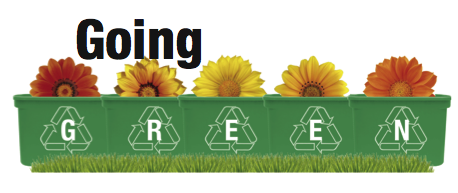
 WEB EXCLUSIVE
WEB EXCLUSIVE
Businesses in the green
In honour of last week's Earth Day, here's a web-exclusive story that looks at what other small and large businesses in the U.S. and in Canada are doing to go green.
 In honour of last week's Earth Day, here's a
In honour of last week's Earth Day, here's a
web-exclusive story that looks at what other small and large businesses in the U.S. and
in Canada are doing to go green.
Starbucks – When designing locations, the company uses paint with lower amounts of volatile organic chemicals, uses reduced-flow fixtures to conserve water, installs energy efficient lights, designs windows to let in natural light and incorporates cabinetry made from post-industrial material.
Harvey’s – The Hamilton, Ont., Harvey’s restaurant on Fennell Avenue is leaner and greener than other Harvey’s locations across Canada. The restaurant uses solar-shades, energy-efficient lighting and a heat recapture system to reuse energy from the cooking grills. With the exception of wrapping (something the company is currently working on), every item in the store can be recycled.
UPS – The delivery company uses a “package flow” software program that works to reduce the number of left-hand turns delivery drivers make. This eliminates the wait time for oncoming traffic, reduces fuel consumption and air pollutants like carbon dioxide.
Royal Bank of Canada (RBC) – Thirty RBC locations in Ontario and 13 branches in Alberta are powered by Bullfrog Power, a provider of carbon-free, green power. Bullfrog sources power from generators that meet the federal government’s Environmental Choice Program EcoLogo. The power comes from sources such as wind power or low-impact water power instead.
Yellow Cab – In 2001, Andrew Grant, a cab driver for Yellow Cab in Vancouver traded in his 1998 Toyota Camry for a Toyota Prius, becoming the world’s first hybrid taxi driver. By 2007, the Yellow Cab company had more than 60 hybrids in its fleet of 220 cabs.
Loblaw Companies Limited – The grocery retailer now has four plastic-bagless locations across Canada. Customers can no longer receive plastic bags at the checkout and instead are encouraged to reuse bags and boxes or purchase environmentally friendly bags. In April 2007, the company made a commitment to reduce one billion plastic grocery bags from Canada’s landfills within one year.
E’terra Inn – This six-storey lodge located in Tobermory, Ont., opened in June 2006 and receives its power from a local wind farm. Other eco-friendly operations include water tanks heated by solar power, locally sourced millwork, flooring and insulation and a low-emission propane system.
Fiesta Farms – Half of the stock at Fiesta Farms, Toronto’s largest independent supermarket, is either natural or organic. The store also works to promote locally grown food. The supermarket joined up with Local Food Plus in 2007 to promote food from Ontario’s greenbelt.
Wal-Mart Canada – At the end of January, the company launched www.forthegreenergood.ca to promote the ways in which Wal-Mart is working to become green. The retail giant has pledged to offer more eco-friendly precuts, to create zero waste and to be supplied 100 per cent by renewable energy.
Erb & Good Family Funeral Home – This Kitchener, Ont. funeral home is proving that there’s potential for almost every industry to go green. In the past year, the home has started using non-toxic, biodegradable embalming fluid and stocks environmentally friendly caskets that are finished with natural oils and are made from sustainably sourced wood such as pine, poplar or ash.
Print this page